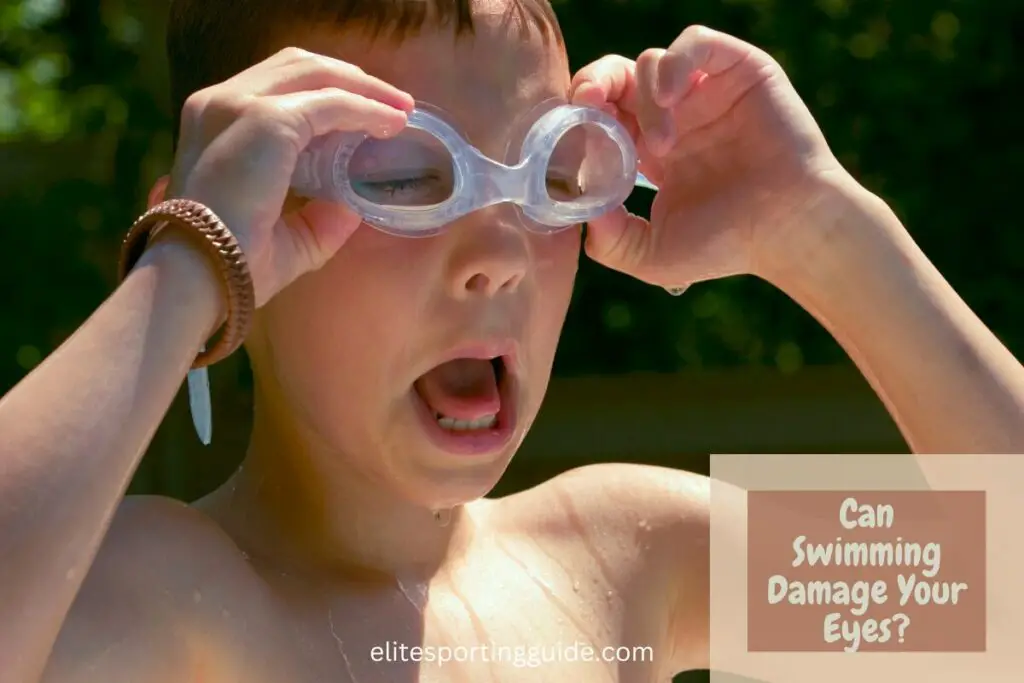While swimming is a popular and healthy physical activity, concerns often arise about the potential impact of chlorinated pool water on eye health.
We breakdown the factors that can contribute to eye irritation during swimming, offer insights into the importance of eye protection, and provide tips on how to keep your eyes comfortable and safe while enjoying the benefits of this aquatic exercise.
Can Swimming Damage Your Eyes?
Swimming itself is not likely to cause direct damage to your eyes. However, prolonged exposure to chlorinated pool water can lead to eye irritation and dryness. To protect your eyes while swimming, consider wearing swim goggles, which create a barrier between your eyes and the pool water, reducing the risk of irritation.
Understanding Eye Irritation

Eye irritation is a common concern for individuals who enjoy swimming, particularly in chlorinated pools.
While swimming is an excellent form of exercise and relaxation, the chemicals used to maintain pool water quality, such as chlorine, can lead to eye discomfort for some individuals.
Here are the factors contributing to eye irritation during swimming and explore ways to mitigate and prevent this issue:
1. Chlorine and Eye Irritation: Chlorine is a standard disinfectant used in pools to kill harmful bacteria and pathogens, ensuring the safety of swimmers.
However, when chlorine combines with organic substances like sweat, urine, or skin cells, it can form irritating chemical compounds.
These compounds, known as chloramines, can create an unpleasant chlorine odor and contribute to eye redness, burning, and itchiness.
2. Other Factors Contributing to Eye Discomfort: Beyond chlorine, other elements can also contribute to eye discomfort during swimming.
Pool water with imbalanced pH levels can be harsh on the eyes, as overly acidic or alkaline water can irritate the delicate eye tissues.
Additionally, pools may contain various waterborne contaminants and allergens, such as pollen or microorganisms, which can exacerbate eye irritation, particularly in individuals with allergies.
3. Recognizing the Symptoms: It’s important to recognize the signs of eye irritation to address the issue promptly.
Common symptoms include redness, itching, burning sensations, excessive tearing, and blurred vision.
If these symptoms persist or worsen, it’s advisable to consult with a healthcare professional to rule out any underlying conditions.
4. Preventive Measures: To enjoy swimming while minimizing the risk of eye irritation, several preventive measures can be taken.
One effective solution is wearing swim goggles, which create a barrier between the eyes and pool water, preventing direct contact and reducing the risk of irritation.
Additionally, swimmers can protect their eyes by showering before entering the pool to remove sweat and other contaminants, and by refraining from urinating in the water, which reduces the formation of chloramines.
Maintaining proper pool water chemistry is another key element in preventing eye irritation.
Pool operators should regularly monitor and adjust the pH and chlorine levels to ensure they are within the recommended ranges.
This helps create a more comfortable swimming environment while still providing effective disinfection.
Understanding eye irritation and its causes while swimming is essential for swimmers of all levels.
By being aware of the factors contributing to eye discomfort and taking preventive measures, individuals can continue to enjoy the benefits of swimming while safeguarding their eye health.
Whether it’s adjusting pool water chemistry or investing in a good pair of swim goggles, these steps can make a significant difference in ensuring a clear and comfortable swimming experience.
The Importance of Eye Protection
Eye protection while swimming is paramount to safeguarding your vision and ensuring a comfortable and enjoyable aquatic experience.
Here is the significance of using appropriate eye protection, primarily through the use of swim goggles, and explore alternative methods to shield your eyes from potential harm in chlorinated pools.
A. Swim Goggles: Your Eye’s Best Friend
Swim goggles are a swimmers’ best defense against eye irritation and damage.
These specially designed eyewear provide a tight seal around the eyes, preventing pool water from coming into direct contact with them.
Here’s why swim goggles are indispensable:
1. Preventing Chemical Contact: Goggles act as a protective barrier, shielding your eyes from chlorine and chloramines in pool water, reducing the risk of irritation and discomfort.
2. Enhancing Visibility: Goggles provide clear underwater vision, making swimming safer by allowing you to see where you’re going and spot potential obstacles or other swimmers.
3. Minimizing Discomfort: With goggles in place, you can enjoy longer and more comfortable swimming sessions without the distraction of irritated, itchy eyes.
B. Alternatives and Considerations
While swim goggles are highly effective, some swimmers may prefer or require alternatives.
Here are a few considerations:
1. Prescription Swim Goggles: If you wear corrective lenses, prescription swim goggles are available to ensure you have clear vision while swimming.
2. Tinted or Polarized Lenses: These types of goggles can reduce glare from the sun when swimming outdoors, improving visibility and protecting your eyes from harmful UV rays.
3. Rinse and Refresh: If you choose not to use goggles, remember to rinse your eyes with fresh water immediately after swimming to help remove any pool chemicals or contaminants.
4. Eyedrops: Over-the-counter lubricating eyedrops can provide relief if you experience mild eye irritation after swimming. Consult a healthcare professional if irritation persists.
Understanding the importance of eye protection in swimming cannot be overstated.
Swim goggles are a simple yet effective solution to safeguard your eyes from the potential harm caused by chlorinated pool water.
Post you may like: Can Swimming Damage Your Knees?
Tips for Keeping Your Eyes Safe
Taking proactive steps to protect your eyes while swimming is essential for maintaining eye health and comfort.
Here are some practical tips to help you keep your eyes safe and irritation-free during and after your swim:
1. Wear Swim Goggles: The most effective way to protect your eyes in the water is to wear well-fitted swim goggles.
Ensure they create a watertight seal around your eyes to prevent pool water from coming into contact with them.
2. Choose the Right Goggles: Select swim goggles that are designed for your specific needs, whether you require prescription lenses, tinted lenses for outdoor swimming, or anti-fog coatings to maintain clear vision.
3. Adjust Goggles Properly: Make sure your swim goggles are adjusted snugly but not too tight. An improper fit can lead to discomfort and leakage.
4. Shower Before Swimming: Rinse off in a pre-swim shower to remove oils, sweat, and other contaminants from your skin and hair.
This helps reduce the formation of chloramines in the pool, which can irritate your eyes.
5. Don’t Urinate in the Pool: While it may seem obvious, avoiding urinating in the pool can significantly reduce the presence of chloramines and minimize eye irritation for you and others.
6. Blink and Lubricate: Blink frequently while swimming to help spread a thin layer of tears across your eyes, providing natural protection.
Lubricating eye drops can be used before and after swimming to keep your eyes moist and comfortable.
7. Take Breaks: If you’re swimming for an extended period, consider taking short breaks to rest your eyes and allow them to recover.
8. Rinse After Swimming: After your swim, rinse your eyes with fresh, clean water to remove any pool chemicals.
This can be done by splashing your face with water or using a gentle saline solution.
9. Avoid Rubbing Your Eyes: Refrain from rubbing your eyes when they feel irritated, as this can exacerbate the discomfort.
Instead, try to blink or use lubricating drops to soothe your eyes.
10. Seek Medical Attention for Persistent Irritation: If you experience prolonged or severe eye irritation, redness, or vision problems after swimming, consult with an eye care professional for a thorough evaluation and appropriate treatment.
By following these tips, you can enjoy your time in the pool while minimizing the risk of eye irritation and ensuring that your eyes remain healthy and comfortable.
Post you may like: Can Swimming Damage Your Skin?
Conclusion
Swimming is a fantastic way to stay active, relax, and cool off, but it’s essential to prioritize the health and comfort of your eyes while enjoying this popular aquatic activity.
In this article, we’ve explored the potential for eye irritation when swimming and provided valuable insights into how to safeguard your vision.
Understanding the causes of eye irritation, such as the interaction of chlorine with pool water and other contributing factors, is the first step in mitigating the issue.
Recognizing the symptoms of eye discomfort and knowing when to seek medical attention can help address any problems promptly.
The importance of eye protection cannot be overstated. Swim goggles, with their ability to create a protective barrier between your eyes and pool water, are a swimmers’ best friend.
Whether you opt for standard goggles or specialized ones like prescription or tinted lenses, the choice to wear them significantly reduces the risk of irritation and enhances your overall swimming experience.
Additionally, following a few simple yet effective tips, such as showering before swimming, avoiding urinating in the pool, and rinsing your eyes after swimming, can make a substantial difference in keeping your eyes safe and comfortable.
Maintaining eye health while swimming is entirely achievable with the right knowledge and precautions.
By understanding the potential risks, investing in proper eye protection, and implementing preventive measures, you can continue to relish the benefits of swimming while ensuring that your eyes remain clear, comfortable, and irritation-free.
So, dive in, enjoy your swim, and keep those eyes protected and healthy for years to come.



